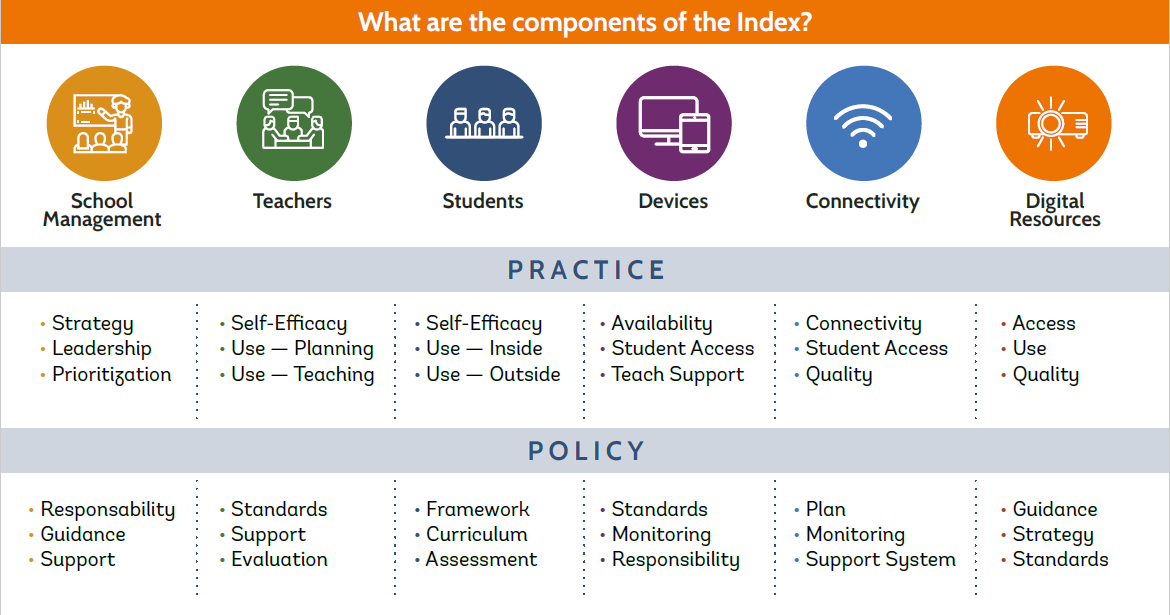The World Bank, with support from Imaginable Futures and as part of the broader Global Education Policy Dashboard (GEPD), has created the EdTech Readiness Index (ETRI). The tool will enable countries to: (a) identify good practices and areas where EdTech policies can be strengthened, and (b) monitor progress as countries take action. With initial technical work completed, the Index is now in its implementation phase, and the team is in the process of identifying the countries in which the ETRI could be piloted in 2022.
The Why: Context and Why We Need it
The COVID-19 pandemic has disrupted schooling for over 1.6 billion students worldwide. As schools closed to keep students, teachers, and communities safe, most countries invested heavily in setting up different modalities to deliver education remotely. But, as we now know, new evidence indicates an “absolute reduction in learning levels”, emphasizing that the effectiveness of these strategies has been limited and that vulnerable groups tend be disproportionately disadvantaged. Many education systems fell short of their goal to ensure the continuity of learning due to the digital divide that kept many without access to any kind of remote learning opportunity. Only 25 percent of low-income countries participating in a global study indicated that they had a plan to offer equitable access to remote learning for marginalized communities.
As countries continue to invest in education technologies (EdTech) to unlock technology’s potential in supporting learning, how do we ensure that these investments increase learning opportunities while reducing inequalities? How do we identify the strengths and weakness of the existing EdTech strategies to ensure appropriate learning environments where children can learn anytime, anywhere?
How do we develop effective and inclusive EdTech policies?
We have developed a tool that might help. The global adoption of EdTech solutions certainly accelerated in response to the pandemic. As countries and international partners gear toward catalyzing EdTech to help unlock education’s promise, there is a clear need for global tools to help inform policy and investment decisions and monitor progress (or lack thereof). Standardized measures need to be developed to allow for benchmarking and to set targets that are globally comparable; this is the motivation behind the EdTech Readiness Index (ETRI).
The What: An EdTech Readiness Index to Inform EdTech Policies
The idea of the ETRI is not new—previous blog posts (here and here) have touted the idea and envisioned what it could look like. Thanks to a partnership with Imaginable Futures, and as part of the broader Global Education Policy Dashboard, this idea has now come to life.
The ETRI goes beyond measuring the availability of devices and the level of connectivity to capture key elements of the larger education-technology ecosystem in a country, guiding efforts to increase learning opportunities and reduce inequalities. As the Figure below shows, the Index is organized around 6 pillars: School Management, Teachers, Students, Devices, Connectivity, and Digital Resources. The first three pillars are the actors in the education system, and the last three are the inputs and infrastructure that the actors need to use EdTech. For each pillar, the ETRI reports on a practice indicator (to capture the practices at the school level), a de jure policy indicator (to capture whether there is a policy to inform each practice), and a de facto policy indicator (to measure the extent to which the policy is implemented). These three types of indicators allow the linking of practices at the school level to the policies that are responsible for them, identifying if the policies both exist and are being implemented. We believe this snapshot can be quite useful to policymakers in catalyzing the power of comprehensive EdTech policies to promote and sustain learning gains.

The How: Remote Data Collection to Meet Current Needs
The EdTech Readiness Index collects fresh data through a School Survey and a Policy Survey. The Policy Survey follows the methodology of the Systems Approach for Better Education Results (SABER) where a legislative review is conducted by a local expert to assess the comprehensiveness of the policy frameworks—something that can be done remotely and independently. The School Survey collects primary data through interviews at the school. Given the risks of in-person collection during the COVID-19 pandemic, the ETRI will follow a flexible approach to data collection. In the short term, enumerators will collect data remotely via phone interviews with school principals. In the medium term, when it is safe to go to the schools in person, enumerators will visit a sample of schools to interview teachers, principals, and students—something that can be done jointly with the GEPD fieldwork. This approach requires local actors to be involved throughout the entire process to facilitate the data collection, but also to ensure that the data are understood, utilized, and leveraged effectively.
If you are interested in piloting the ETRI in your country or would like to learn more, you can contact the team at: ETRI@worldbank.org. Please stay tune to see how this work progresses.
Related Links:
EduTech’s Podcast Episode on EdTech Readiness Index
Brief on EdTech Readiness Index






Join the Conversation